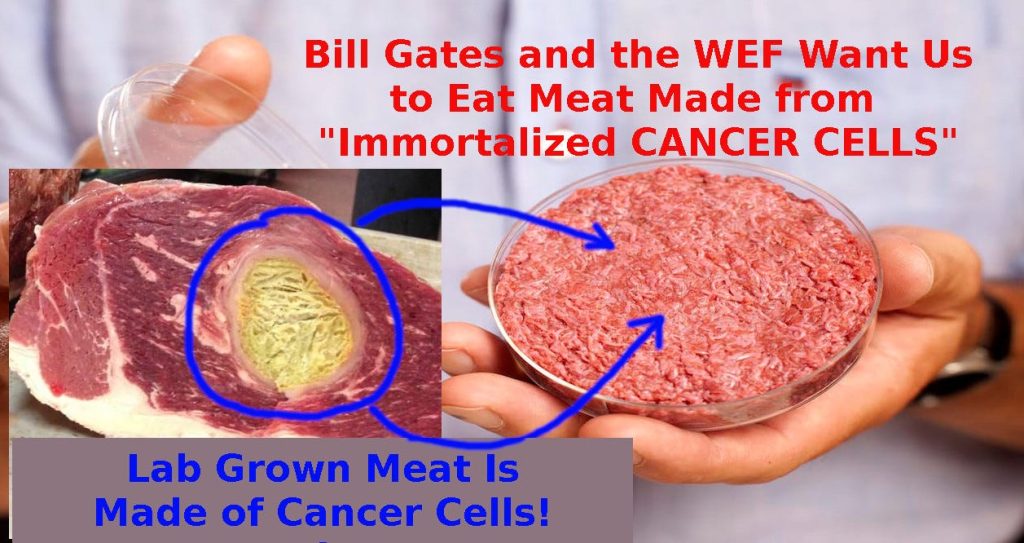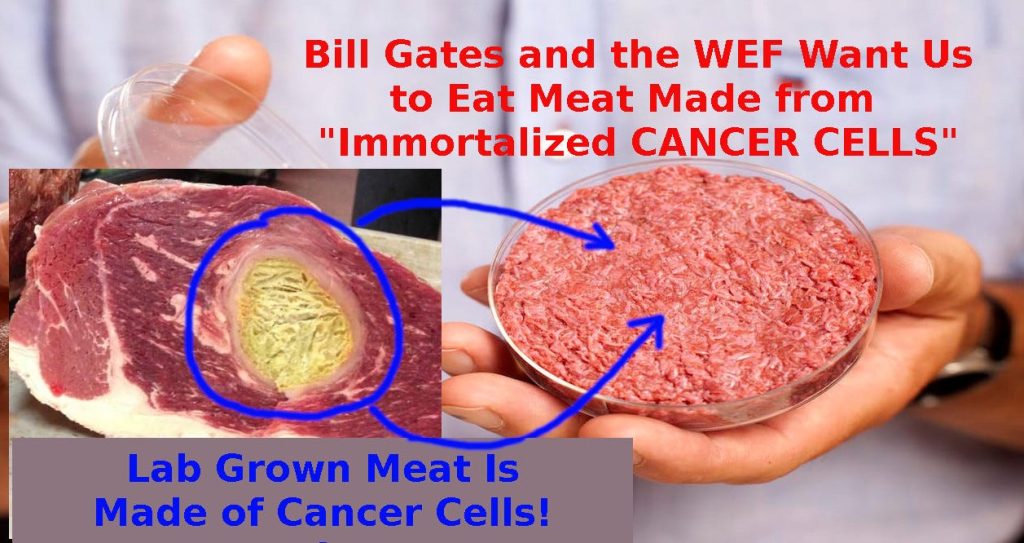Lab-Grown Meat Is Made of Cancer Cells. Would You Like It Rare or Medium?

USDA does not allow animal tumors to enter food chain. But lab-grown meat is made of tumor cells
According to Bill Gates and the World Economic Forum, ongoing global warming threatens to destroy humanity. Methane, coming from the belches and farts of cows, is a greenhouse gas (GHG). So, cows are a problem!
Fortunately, Bill Gates has a solution for us, explained in this video. We need to stop growing cattle and switch to lab-grown synthetic beef.
The World Economic Forum expects we will eat “synthetic meat” in 16 years. (the article below was written 4 years ago)

Bill Gates made sizable investments in “synthetic meat” manufacturers, expecting to turn a nice profit.

The CNBC article explains that “lab-grown meat,” that is, cell cultures grown in giant stainless vats, is not the same as “fake meat” made of soy or pea protein:
Vegetarians have long touted the ethical and environmental problems with meat production and consumption. Start-ups such as MosaMeat, JUST and Memphis Meats are tissue-engineering meat in a lab to allow people to enjoy being a carnivore without any of the environmental or ethical hang-ups.
Dubbed clean meat, the efforts are distinct from “fake meat,” like the soy protein “chicken” you can find in your grocery store today. Unlike Morningstar or Boca Burgers, clean meat really is meat; it just grows in a lab instead of being part of an animal.
Okay, but what kinds of cells is that lab meat grown from?
Lab-Grown “Meat” is Made of “Immortalized” Cancer Cells
This excellent Bloomberg article (paywall-free link) clarifies that all lab meat is grown as immortalized tumor cells. As the article explains, these same cells are used to produce traditional vaccines.
Thank the biotech revolution. Under the right conditions, animal cells can be grown in a petri dish, or even at scale in factories full of stainless-steel drums. For decades, companies such as Pfizer Inc. and Johnson & Johnson have cultured large volumes of cells to produce vaccines, monoclonal antibodies and other biotherapeutics. Now the idea is that we might as well eat these cells, too.
What are these cells?
The big honking asterisk is that normal meat cells don’t just keep dividing forever. To get the cell cultures to grow at rates big enough to power a business, several companies, including the Big Three, are quietly using what are called immortalized cells, something most people have never eaten intentionally. Immortalized cells are a staple of medical research, but they are, technically speaking, precancerous and can be, in some cases, fully cancerous.
The article puts a “human face” on some of these cell lines, for example, the “HeLa line” made from the cervical cancer of Henrietta Lacks:
That’s where immortalized cells come in. They’ve been used in medical research since the early 1950s, when the first and most famous immortal cell line—derived from the cervical cancer cells of a woman named Henrietta Lacks—was successfully grown in a lab.

The distinction between pre-cancerous and cancerous cells is relatively minor: cancerous cells, by definition, can float away from the tumor site, travel through the blood or lymph, and start a new tumor (metastases) in another location in the body.
The distinction is important for the clinical outcome of a patient with a newly discovered tumor but involves only a minor bio-cellular distinction.
Don’t worry: Prominent cancer researchers tell Bloomberg Businessweek that because the cells aren’t human, it’s essentially impossible for people who eat them to get cancer from them, or for the precancerous or cancerous cells to replicate inside people at all. … And cow tumors sometimes wind up in store-bought ground chuck, too. [not true – tumors are NEVER allowed by USDA inspectors – see below – I.C] Of course, the facts might not matter much if ranchers or other players in the traditional meat industry felt threatened enough to declare a public-relations war. It’s all too easy to imagine misleading Fox News chyrons about chicken tumors and cancer burgers.
Not so misleading! The main problem of growing an endless “lab meat” supply is that normal tissue cells cannot endlessly replicate (see above). There is a limit on how many times they will divide.
Vaccine manufacturers already use such immortalized tumor cells to make some Covid vaccines and other vaccines:
Today, AstraZeneca Plc and J&J’s Covid-19 vaccines are grown using immortalized human kidney and retinal cells, respectively.
Thus, “lab meat” and “cell line” suppliers grow meat from tumor cells that are “immortalized”; in other words, their cells can endlessly replicate. This is why cancers never stop growing, after all!
Eat Just Inc. declined to comment for this story. Believer Meats Chief Scientific Officer Yaakov Nahmias says that his company uses immortalized cells in its cultured chicken and that his team has somehow, by means he says even they don’t understand, created immortalized cells that don’t share any genetic signatures with cancer cells.
Are you skeptical of the above? I am. Even Bloomberg author Joe Fassler, to his credit, doubted the above explanation and asked independent biologists who also did not believe Yaakov Nahmias’s BS:
(Two cell biologists I shared his comments with expressed skepticism.)
We can see that so far, all lab meat is made using endlessly-dividing tumor cells.
Our bodies’ immune systems are designed to kill off and fight such abnormal and cancerous cells. Thus, cancers only take hold when immune systems weaken or the cancer cells learn to avoid immune reactions.
Cells become immortal in human bodies all the time, by mutating to bypass senescence—and mutating some more to evade the immune system, which generally tries to kill off such mutants.
The lab meat companies plan to sell those kinds of solid tumor cells to us to eat.
Bon appetit!
USDA Inspectors Screen Out Cancers and Tumors in Animal Carcasses
Despite Bloomberg’s restrained and soothing language, cancers and tumors can never pass USDA meat inspections.

Clarifications
The above story applies to “lab-grown meat”: products made from immortalized animal tumor cells growing in vats.
The “plant substitute” meat replacements, such as Beyond Meat, are based on pea or soy protein. As such, they are NOT related to these lab-grown cancer cell projects. Those plant products are not “meat” in any sense.
In addition, fake news websites are screaming that lab-grown meat (made of tumor cells) will give us cancer. There is no evidence that lab-grown meat will facilitate cancers. There is also no evidence that lab-grown meat will NOT cause cancers. It is simply an unknown. The USDA has a reason to reject tumor-containing carcasses, however. It is best not to make unwarranted claims, and my substack is not about making up sensationalized stuff.
Now They Want to Sell Us Solid Tumor “Steaks”
- The Bloomberg article explains that all “lab meat” is made of tumor cells.
- At the same time, USDA regulations forbid tumors in meat supply for humans.
I am sure that one way or another, Bill Gates and the WEF will lobby for a change in rules so that they can sell us solid tumors as “lab-grown meat.”
At this point, I am torn: would I rather eat “ze bugz”, or “lab-grown tumor meat.” Or go vegetarian? A tough decision!
What would YOU choose?

One of our country’s most important freedoms is that of free speech.
Agree with this essay? Disagree? Join the debate by writing to DailyClout HERE.






Methane is a product of the fermentation of complex carbohydrates. It does come from the digestive tracts of ruminants: cows, sheep, goats, but also deer, elk, moose, antelope, etc. The main source of methane in the world is swamps and rice paddies. The focus on cows is purely political.
Before I eat any of their filth, I will hunt, and eat those pushing this agenda. I am a good cook, been doing it for 25+ yrs. Long pig BBQ for them.
We should force feed it to Bill gates 3 -4 times every day
I have not eaten an animal in decades, however, I would hunt, fish, and raise my own animals before I would ever eat their Malthusian poison.
We will need to produce our own food or have skills to trade for local food.
Never submit.